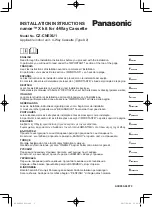
Outer diameter
ø 6.35
ø 9.52
ø 12.7
ø 15.88
ø 19.05
ø 22.2
ø 25.4
ø 28.58
Wall thickness
0.8
0.8
0.8
1.0
1.0
1.2
1.0
1.0
2
PRECAUTIONS FOR NEW REFRIGERANT R 407 C INSTALLATION
1. Care regarding piping
1-1. There is no need to change piping and tube wall thickness. Use refrigerant pipes of the same wall thickness as R22.
Copper tube
1-2. Prevent impurities including water, dust and oxide
from coming into the pipe. Impurities can cause R407C
refrigerant deterioration and compressor defects. Due
to the different features of the refrigerant and
refrigerating machine oil, the prevention of water and
other impurities becomes more important than ever.
2. Make sure to refill the refrigerant in liquid form
2-1. Since R 407 C is a non-azeotrope, refilling the
refrigerant in gas form can lower performance and
cause defects of the unit.
2-2. Since refrigerant composition changes and
performance decreases when gas leaks, collect the
remaining refrigerant and refill the required total amount
of new refrigerant after fixing the leak.
3. Different tools
3-1. Tools specs have been changed due to the features
of R 407 C. Some of the R 22 tools cannot be used.
EG
WARNING
• This symbol refers to
a hazard or unsafe
practice which can
result in severe
personal injury or
death.
IN CASE OF IMPROPER INSTALLATION
The manufacturer shall in no way be responsible for improper
installation or maintenance service, including failure to follow
the instruction in this document.
When Transporting
Be careful when picking up and moving the indoor and outdoor
units. Get a partner to help, and bend your knees when lifting
to reduce strain on your back. Sharp edges or thin aluminum
fins on the air conditioner can cut your fingers.
When Installing
…In a Room
Properly insulate any tubing run inside a room to prevent
“sweating” that can cause dripping and water damage to walls
and floors.
…In Moist or Uneven Locations
Use a raised concrete pad or concrete blocks to provide a
solid, level foundation for the outdoor unit. This prevents water
damage and abnormal vibration.
…In an area with High Winds
Securely anchor the outdoor unit down with bolts and a metal
frame. Provide a suitable air baffle.
When Connecting Refrigerant Tubing
• Executive enough ventilation in case refrigerant gases leak
during operations. Be careful that the contact of the
refrigerant gases with the flare will cause the generation of
poisonous gases.
• Keep all tubing runs as short as possible.
• Use the flare method for connecting tubing.
• Apply refrigerant lubricant to the matching surfaces of the
flare and union tubes before connecting them, then tighten
the nut with a torque wrench for a leak-free connection.
• Check carefully for leaks before starting the test run.
When Servicing
• Turn the power OFF at the main power box (mains) before
opening the unit to check or repair electrical parts and wiring.
• Keep your fingers and clothing away from any moving parts.
• Clean up the site after you finish, remembering to check
that no metal scraps or bits of wiring have been left inside
the unit being serviced.
CAUTION
• This symbol refers to
a hazard or unsafe
practice which can
result in personal
injury or product or
property damage.
SPECIAL PRECAUTION
• ELECTRICAL SHOCK CAN CAUSE SEVERE
PERSONAL INJURY OR DEATH. ONLY A
QUALIFIED, EXPERIENCED ELECTRICIAN
SHOULD ATTEMPT TO WIRE THIS SYSTEM.
When Wiring
• Do not supply power to the unit until all wiring and tubing are
completed or reconnected and checked.
• Highly dangerous electrical voltage are used in this system.
Carefully refer to the wiring diagram and these instruction
when wiring. Improper connections and inadequate
grounding can cause
accidentally injury or death
.
•
Ground the unit
following local electrical codes.
• Connect all wiring tightly. Loose wiring may cause
overheating at connection points and a possible fire hazard.




































